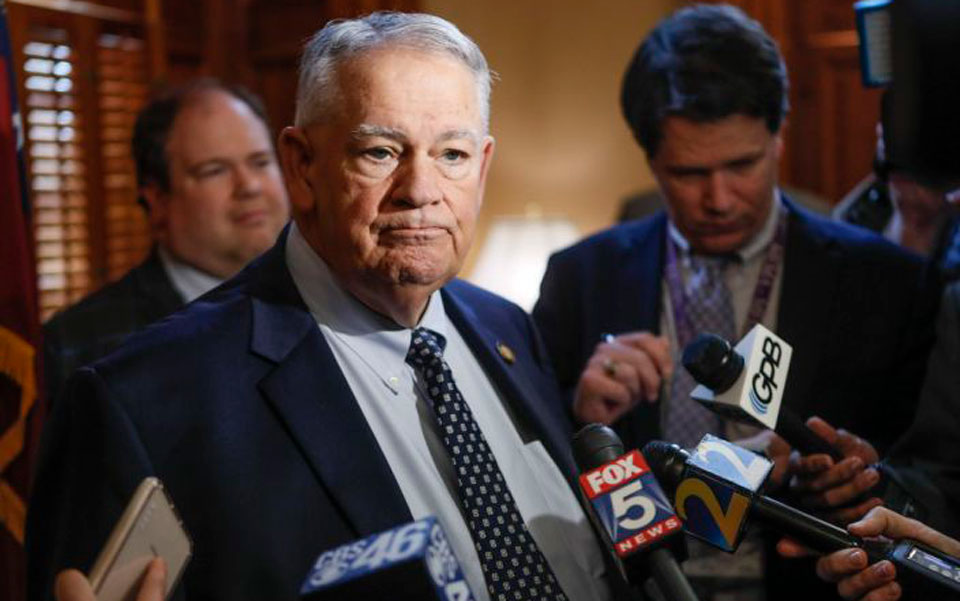
Although Donald Trump’s legal team is losing court battles left and right, its false narrative of voter fraud run amok has emboldened the Republican party’s ongoing strategy of voter suppression.
This suppression poses not only a threat to the upcoming Georgia run-off races but to the future of all elections to come.
While tweeting capitalized words like “FRAUD” and “DISGRACE,” the White House occupant Trump has been unyielding in his desire to cast doubt on the results of the historic November 3 presidential election. His legal team, led by the erratic Rudy Giuliani, has created a political circus in courtrooms across the country with baseless accusations of voter fraud.
Just this past week the U.S. Supreme Court handed another defeat to Trump by rejecting Republican demands to throw out nearly 2.5 million mail-in ballots in Pennsylvania. Despite these defeats, dangerous groundwork is being put in place by the GOP to suppress the vote under the guise of protecting the “integrity” of the elections. This so-called upholding of integrity is coming in the forms of strict voter ID laws, voter purges, and the dwindling of voting access.
Voter ID laws have been one way in which the Republican party has been able to prevent certain segments of the population from exercising their right to vote. Often the requirement of presenting a certain kind of government issued identification at the time of voting has been shown to disproportionately adversely affect people of lower income, people of color, the elderly, and people with disabilities.
As explained by the American Civil Liberties Union (ACLU), “millions of Americans lack ID. 11% of U.S. citizens – or more than 21 million Americans – do not have government-issued photo identification.” This is often due to the obstacles of proper transportation and money needed to obtain such identification. Furthermore, on a national scale up to 25% of Black citizens of voting age lack government-issued photo ID, as compared to only 8% of white voting age people.
With these figures, it must come as no surprise that since the November elections, where a high proportion of Black voters helped to determine Joe Biden’s victory in key states, there has been a ramping up by Republican officials to uphold or implement voter ID laws.
The myth of voter fraud
This month the North Carolina legislature won a victory in a key voter ID case. A federal appeals court ruled that Republican lawmakers didn’t act with racist intentions when they passed a voter ID law back in 2018. In 2019 this voter ID legislation was struck down, thus making it so the requirement wasn’t in place during the 2020 presidential election. Now, after this recent court win, North Carolina officials, like Republican N.C. House Speaker Tim Moore, are hoping to have these ID laws in place by the next election cycle.
“If the 2020 elections have taught us anything, it is the fact that voting in person with a photo ID is the best way to ensure the integrity of our elections,” Moore was quoted as saying to the press on December 2.
The thing is, that isn’t what the 2020 elections showed the world. In fact, many extensive studies before and after the elections have determined that “voter fraud” conjured up by the GOP is rare and hardly a threat at all.
One detailed study of 12 years of elections in five states found only 500 cases of alleged voter fraud. Back in 2016, the North Carolina State Board of Elections released the results of an extensive election audit. It found that out of 4.8 million votes only one could have been avoided with a voter ID law. The facts of the matter render Moore’s assertion to be a work of GOP fiction that could have very real consequences on voters in marginalized communities. The upcoming target is voters in Georgia.
Georgia next GOP target
Trump’s presidential defeat was one part of removing a major roadblock to progress. The next step is weakening the power of figures like GOP Senate Majority Leader Mitch McConnell.
McConnell and his Republican gang have been a constant roadblock to greatly needed relief for working people during the COVID-19 pandemic. Taking the majority power from Senate Republicans is imperative for change. This is why voter suppression is alive and well in Georgia as we head towards the January 5 run-off elections.
The races between Republicans Kelly Loeffler and David Perdue against Democrats Rev. Raphael Warnock and Jon Ossoff are tight. History was made in November when the historically red-leaning Georgia went blue for Biden, showing that every vote counts. Now, there are maneuvers by Republican officials to put a damper on the population of Black and brown voters who showed up to the polls to make their voices heard.
A recent complaint has been filed against Georgia Secretary of State Brad Raffensperger, alleging that in 2019 close to 200,000 voters were wrongfully purged from the voting rolls based on the false assumption they had moved from their place of residence.
This obstructive tactic sounds similar to Georgia’s “exact match” rule that flagged nearly 53,000 voter applicants during the 2018 tight governor race between the progressive Stacey Abrams and Republican Brian Kemp. The Black voter applicants made up 70 percent of the 53,000 withheld. Kemp, who at the time served as the Secretary of State in charge of voter regulation, was also accused of purging nearly 700,000 voters from the state’s voter rolls between 2016-2018.
Now, Raffensperger, another Republican who took over after Kemp became governor, has proposed major election changes, including a voter ID requirement for mail-in voting. On November 20 he was quoted as saying “close elections sow distrust,” and “people feel like their side was cheated.”
This statement doesn’t line up with reality as the election was not close. Biden beat Trump by over seven million votes. It wasn’t a non-existent close race that cast doubt on the election, it was the GOP. They are using this doubt to justify their restrictive measures for January.
In the third most populous county in Georgia, Cobb County, only 5 out of the previously 11 early-voting locations will be open for the runoffs. Biden won the county, which has densely populated areas of Black and Latino voters, by 14%. Closing more than half of the polling places leaves those nearly 537,000 voters with fewer places to exercise their right, and longer lines to wait in.
On December 7, Georgia Republicans seemingly declared war on the people’s right to vote by issuing a press release that detailed a plan to restrict access to voting. The Republican Senate majority caucus stated “we will reform our election laws to secure our electoral process by eliminating at-will absentee voting,” and “we will require photo identification for absentee voting for cause, and we will crack down on ballot harvesting by outlawing drop boxes.”
Once again, this ramping up of restrictions is under the guise of wanting integrity when, in reality, there is no actual evidence of widespread fraud. It comes off more like a GOP attempt to hold onto power.
Beating back the Republican playbook
The rights of voters have been under attack since the removal of a major provision in the Voting Rights Act (VRA) by the Supreme Court in 2013. Suppressive voting rules throw hurdles in front of many potential voters, preventing them from turning out to support their candidates of choice. This is deliberate because as both Lindsey Graham and Donald Trump admitted, when there are fewer restrictions to voting, Republicans lose out.
Trump’s insistence on a rigged election may end in his defeat, but it will fuel the fire of the GOP’s push to silence the millions who came out to rebuke their rule.
Voter suppression is what working people will have to keep an eye on as we go towards the run-off elections in Georgia. It will also be something to combat when the 2022 midterm elections come around. Electoral activism is crucial to progress, and it must be defended.












Comments